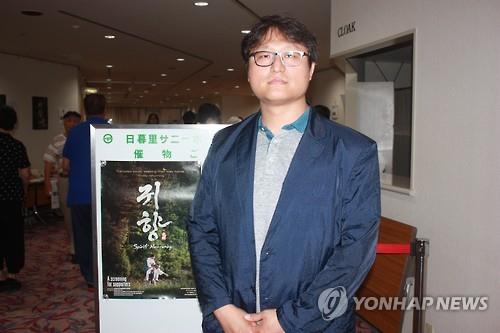- California Assembly OKs highest minimum wage in nation
- S. Korea unveils first graphic cigarette warnings
- US joins with South Korea, Japan in bid to deter North Korea
- LPGA golfer Chun In-gee finally back in action
- S. Korea won’t be top seed in final World Cup qualification round
- US men’s soccer misses 2nd straight Olympics
- US back on track in qualifying with 4-0 win over Guatemala
- High-intensity workout injuries spawn cottage industry
- CDC expands range of Zika mosquitoes into parts of Northeast
- Who knew? ‘The Walking Dead’ is helping families connect
‘Spirits’ Homecoming’ director hopes his film makes viewers ponder comfort women issue
TOKYO, July 22 (Yonhap) — The director of a Korean film depicting the lives of women sexually enslaved by Japanese troops during World War II hoped his film will provide viewers with a chance to think about the painful issue.
“I didn’t make the film simply out of an anti-Japanese sentiment,” Cho Jung-lae said in an interview with Yonhap News Agency at a Tokyo hotel before holding the first community screening of the movie in the city on Thursday. “I hope this would be the starting point for agonizing over peace and how to resolve the issue.”
“Spirits’ Homecoming” follows women who were forced to work in Japanese military brothels during the war. Historians estimate that more than 200,000 women, mostly from Korea, were abused when Korea was under Japanese colonial rule from 1910-45.
Early this year, the drama film drew more than 3.5 million viewers in South Korea, an unexpected success for a small-budget film. Unable to find an official distribution channel in Japan, however, the film went on a screening tour of 13 Japanese cities, including Tokyo, that day.
“For those who don’t know the ‘comfort women’ issue well, I want to let them know the truth.”
Cho expressed thanks to generous support from mostly the ethnic Korean residents in Japan, which made the free community screenings possible.
“I feel honored and thrilled to have this meaningful chance,” he said. “Although it is no longer being screened in South Korea, I’ll do my best to promote the film in Japan and the rest of the world, starting today.”
In December, South Korea and Japan reached a landmark deal in which Tokyo apologized for its colonial-era atrocities and agreed to provide 1 billion yen (US$9.6 million) for the creation of a foundation aimed at supporting the surviving victims. The foundation is expected to reach next week, according to news reports.
However, victims and liberal civic groups have accused the government of striking a deal lacking Japan’s acknowledgment of legal responsibility. They also said the agreement was reached without prior consultations with the victims.
“What the victims want is a sincere apology and proper compensation,” Cho continued. “I hope their opinions will be respected more.”
The movie took its inspiration from a drawing titled “Burning Women” created by Kang Il-chul.
Despite budget shortages and other initial difficulties, the film was completed 14 years after production began with the support and donations of more than 75,000 people.












